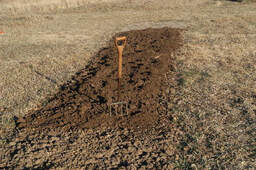
If the summer weather has brought an early end to your garden, consider adding organic materials directly to the soil rather than composting. Materials such as residue from lawn renovation, rotted hay, or rotted silage can be added and then tilled in. Leaves fallen from trees can be added as they become available. Most grass clippings can also be tilled in but avoid grass clipping from lawns that have been sprayed with a crabgrass killer. This product can carry over and harm the garden the following year. Crabgrass preventers are fine but crabgrass killers are not.
Organic materials can be spread to a depth of about 3 inches and tilled or dug in. Coarser materials such as tree leaves or garden residue should be shredded before tilling. A lawn mower with a bagging attachment can be used to shred this material and collect it in one operation. Be sure the soil is not too wet before tilling. During warm weather, the material will decompose quickly and the process can be repeated every two weeks. Later in the fall, it may take longer. This process can be repeated from now until late November to early December.
Remember that organic matter helps almost any soil. It improves clay soil by improving tilth, aeration and how quickly the soil takes up water. In sandy soils, it acts as a sponge by holding water and nutrients. (Ward Upham)
 RSS Feed
RSS Feed
